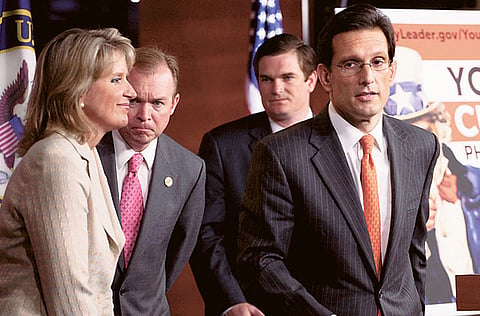Worldly Wise: US lawmakers get it wrong on big oil tax breaks
The tax deduction in question was enacted in 2004 and applies to all domestic manufacturers, not just oil and gas companies

Senate Democrats want to eliminate a tax break for the five biggest multinational oil companies. Republicans oppose the idea on the grounds that rescinding a tax break qualifies as a tax increase.
Both parties are missing the boat. By confining their disagreement to select deductions for a few oil producers, lawmakers are squandering an opportunity to examine all forms of tax breaks and make a real dent in the deficit.
The tax deduction in question was enacted in 2004 and applies to all domestic manufacturers, not just oil and gas companies.
It was designed to increase competitiveness in the face of the US's 35 per cent corporate tax rate, among the highest in the developed world.
Democrats settled on the five biggest oil producers as their first target. These companies just happened to earn a combined $36 billion in the first quarter.
The Senate Finance Committee summoned the chief executive officers of ExxonMobil, Chevron, ConocoPhillips, Royal Dutch Shell and BP Plc to Washington last week to discuss shared sacrifice. At a time when consumers are struggling to fill the tank with $4-a-gallon gas, senators wanted to know if big oil could relinquish a benefit that would save the government $21 billion over 10 years.
Of course, that saving, if it ends up being saved, is a drop in the bucket when the US budget deficit will top $1 trillion in 2011 for the third consecutive year.
Real money
Eliminating the special exemptions that have been written into the tax code over the years would be one of the simplest and most fruitful ways to raise federal revenue.
Tax policy experts put the annual cost of these so-called tax expenditures at roughly $1 trillion. That's real money.
Unless you believe this loss of revenue leads to smaller government, one person's tax break is another person's tax increase. How did the anti-tax GOP justify these tax expenditures in the first place?
The argument against tax breaks for oil companies is clear-cut.
"They make the economy less, not more, efficient and do nothing to reduce prices at the pump," said Jerry Taylor, a senior fellow at the libertarian Cato Institute in Washington.
Any preferred tax treatment attracts private investment in search of higher artificial profits.
If lawmakers are serious about deficit reduction, they should look at all tax breaks for all industries and all companies, not just those for five profitable oil and gas producers.
Tax neutrality should be the goal: a tax system that encourages the private investment on its own merit, not for tax reasons. Tax neutrality would broaden the tax base and allow the government to lower income tax rates on individuals and corporations.
ConocoPhillips CEO James Mulva was right when he said the Senate proposal to rescind tax breaks on only five select companies was "un-American." (It was equally un-American to enact them.) ExxonMobil chief Rex Tillerson called it "discriminatory" and "punitive."
"Everything for everybody everywhere ought to be on the table," Tillerson told the Senate Finance Committee last week.
To her credit, Republican Senator Olympia Snowe of Maine said all subsidies and tax incentives, many of which are on "cruise control," should be re-examined. The last time Congress took a stab at reducing corporate welfare was in 1986.
Snowe's colleagues were more interested in scoring points and playing "gotcha." Chuck Schumer, Democrat of New York, used language like "gouged" at the pump to strengthen his argument for targeting big oil firms.
Every time Congress wants to raise the tax rate paid by his Wall Street donors, er, constituents, Schumer argues that any change has to be all-inclusive. Members of the Senate Finance Committee tried to get the oil executives to admit they don't need incentives, at least in the sense most of us think of need.
The argument for government-subsidised investment goes something like this. Government needs to intervene at times to stabilise the economy; to correct for market failures such as externalities, where economic transactions have an adverse effect on third parties; and to encourage desirable behaviour, such as home ownership.
In addition, certain investments may have a hurdle rate before they turn a profit. Without government assistance, no company could survive long enough to see the investment bear fruit.



